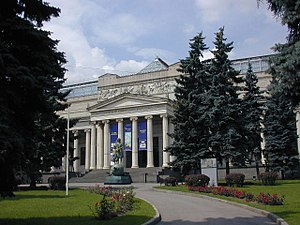Pushkin Museum

The Pushkin Museum of Fine Arts (Russian: Музей изобразительных искусств им. А.С. Пушкина) is the largest museum of European art in Moscow, located in the Volkhonka street, just opposite the Cathedral of Christ the Saviour.
The museum's name is totally misleading, as it has nothing to do with the famous Russian poet. It would be fair if the museum was named for its real founder, professor Ivan Tsvetaev (father of the poet Marina Tsvetaeva). Tsvetaev persuaded the young millionaire Yuriy Nechaev-Maltsev and the fashionable architect Roman Klein of the urgent need to give Moscow a fine arts museum.
Designed by Klein and Shukhov, financed by Maltsev, the museum building had been constructed from 1898 to 1912. The dream of Tsvetaev's life came true in May 1912, when the museum opened its doors to the public. Its first exhibits were copies of ancient statuary, thought indispendable for education of art students. The only genuinely ancient items - Moscow Mathematical Papyrus and Story of Wenamun - had been contributed by Vladimir Golenishchev three years earlier.

After the Russian capital was moved to Moscow in 1918, the Soviet government decided to transfer thousands of works from St Petersburg's Hermitage Museum to the new capital. These paintings formed a nucleus of the Pushkin museum's collections of Western art. But the most important paintings were added later from the State Museum of New Western Art. These comprised a supreme assortment of Impressionist and Post-Impressionist artwork, including top works by Van Gogh, Gauguin, Picasso, and Matisse.
After the World War II the evacuated Dresden Gallery had been stored in Moscow for 10 years. The Dresden collection was finally returned to East Germany, despite strong opposition from the museum officials, notably M-me Antonova, who has been running the museum since February 1961. The Pushkin Museum is still a main depositary of Troy's fabulous gold unearthed by Heinrich Schliemann and confiscated by the Red Army from the Pergamon Museum in Berlin.
The International musical festival Svyatoslav Richter's December nights has been held in the Pushkin museum since 1981.
